
Across the country, states and localities are increasingly moving to end marijuana prohibition laws. For immigrant communities, despite the changing attitude toward marijuana-related conduct at the state level, an old conviction can still form the basis for immigration-related consequences at the federal level. Though federal legal reforms may be the only way to completely eradicate the immigration consequences of marijuana-related conduct and convictions, reforms at the state level can nevertheless help stop the arrest-to-deportation pipeline. Drawing from our experience with state and municipal efforts across the country, this resource, jointly produced by the Immigrant Legal Resource Center, the Immigrant Defense Project, and the Drug Policy Alliance, lists best practices for municipalities and states looking to decriminalize in a way that lessens the immigration-related harms of marijuana criminalization.
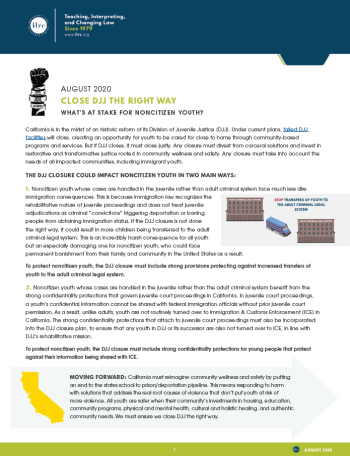
California is in the midst of an historic reform of its Division of Juvenile Justice (DJJ). Under current plans, failed DJJ facilities will close, creating an opportunity for youth to be cared for close to home through community-based programs and services. But if DJJ closes, it must close justly. Any closure must divest from carceral solutions and invest in restorative and transformative justice rooted in community wellness and safety. Any closure must take into account the needs of all impacted communities, including immigrant youth. This resource highlights the two main ways that noncitizen youth may be impacted by the DJJ closure and makes recommendations to ensure that DJJ closes justly for all.

A one-page issue spotting decision tree to help screen for potential forms of post-conviction relief. For an in-depth discussion of any of these vehicles, see this guide, created by the ILRC and Californians for Safety and Justice.
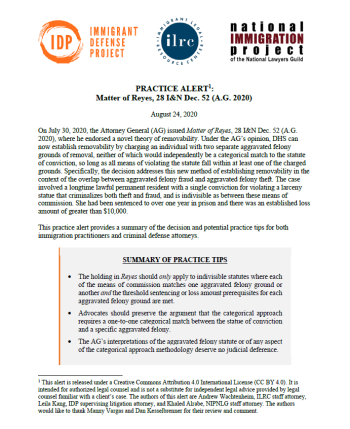
On July 30, 2020, Attorney General Barr issued Matter of Reyes, 28 I&N Dec. 52 (A.G. 2020), a case involving a longtime lawful permanent resident with a single conviction for violating a larceny statute that criminalizes both theft and fraud, and is indivisible as between these means of commission. She had been sentenced to over one year in prison and there was an established loss amount of greater than $10,000. This practice alert provides a summary of the decision and potential practice tips for both immigration practitioners and criminal defense attorneys representing noncitizens in criminal and immigration cases. These tips focus on challenging the correctness of the AG's new theory of removability, challenging any judicial deference to the AG's opinion, fighting DHS efforts to file new NTAs or motions to reopen past proceedings, contesting retroactive application of the new decision, and criminal defense strategies for avoiding its reach in advising noncitizens on resolving open criminal matters.
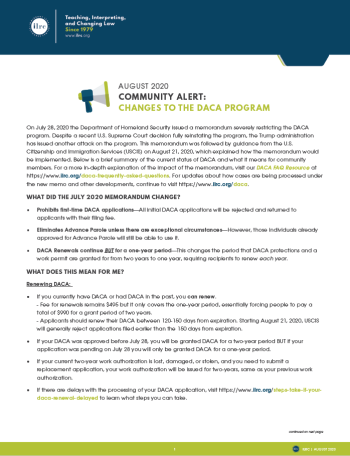
On July 28, 2020 the Department of Homeland Security issued a memorandum severely restricting the DACA program. Despite a recent U.S. Supreme Court decision fully reinstating the program, the Trump administration has issued another attack on the program. This community alert gives a brief summary of memorandum and the U.S. Citizenship and Immigration Services Implementing Guidance issued on August 21, 2020 and what it means for community members.
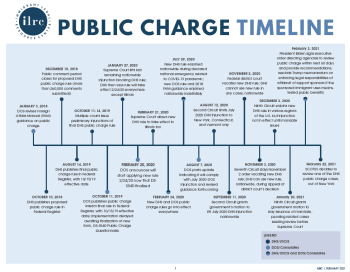
This timeline provides a quick, visual summary of the changes to public charge policy at the Department of Homeland Security (DHS) and the Department of State (DOS) from January 2018 through July 29, 2021.
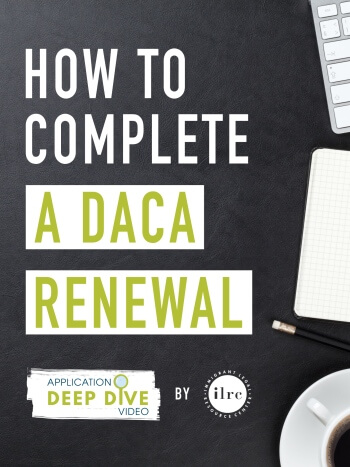
This video details how to complete a DACA renewal application packet by walking through the various forms’ questions to highlight what they mean and focus on areas worth paying close attention to. As always, we highly encourage applicants to seek a consultation with a trusted legal service provider before submitting their packets. Namely this is so applicants can ensure they are submitting their information as accurately as possible and addressing the dimensions of their specific case that may or may not allow them to be eligible for other forms of immigration relief. In this one-hour walkthrough video, the ILRC’s Legal Outreach Coordinator, Abraham Bedoy, dives deep into each form required for a renewal so those taking on their own application packet (forms: I-821D, I-765, I-765WS, G-1145) can follow along to double-check their entries.
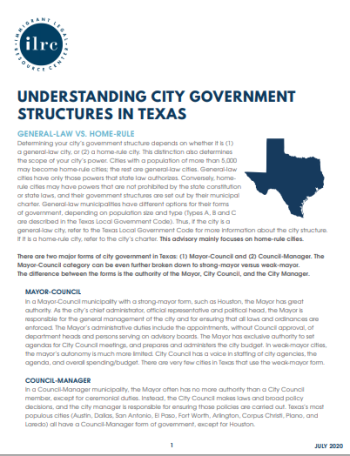
Before pushing for change at the city level, it is important to understand your city government’s structure, as well as the responsibilities and powers of elected and appointed city officials, such as the Mayor, City Council, Police Chief, City Attorney and City Manager. This resource is for Texas advocates and explains the differences between the two major forms of city government in Texas, the powers of important city officials, and how various forms of city government affect the roles of those officials.
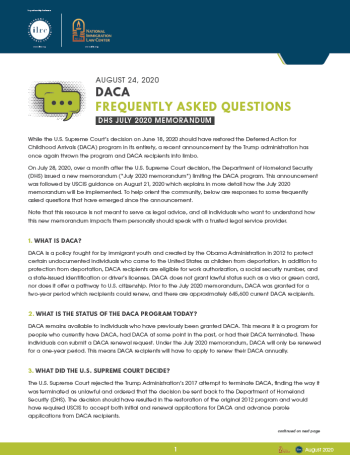
While the U.S. Supreme Court’s decision on June 18, 2020 should have restored the Deferred Action for Childhood Arrivals (DACA) program in its entirety, a recent announcement by the Trump administration has once again thrown the program and DACA recipients into limbo. This resource goes over frequently asked questions to help orient the community of this new change with DACA program.
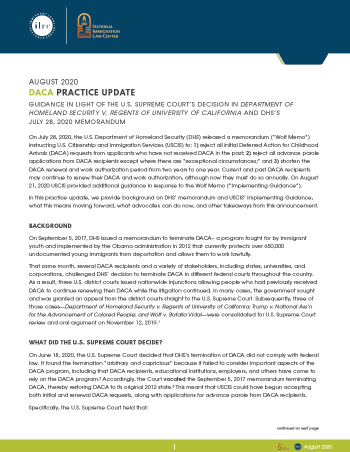
On July 28, 2020, the U.S. Department of Homeland Security (DHS) released a memorandum instructing U.S. Citizenship and Immigration Services (USCIS) to: 1) reject all initial Deferred Action for Childhood Arrivals (DACA) requests from applicants who have not received DACA in the past; 2) reject all advance parole applications from DACA recipients except where there are “exceptional circumstances;” and 3) shorten the DACA renewal and work authorization period from two years to one year. This Memorandum was followed by USCIS additional guidance on August 21, 2020.